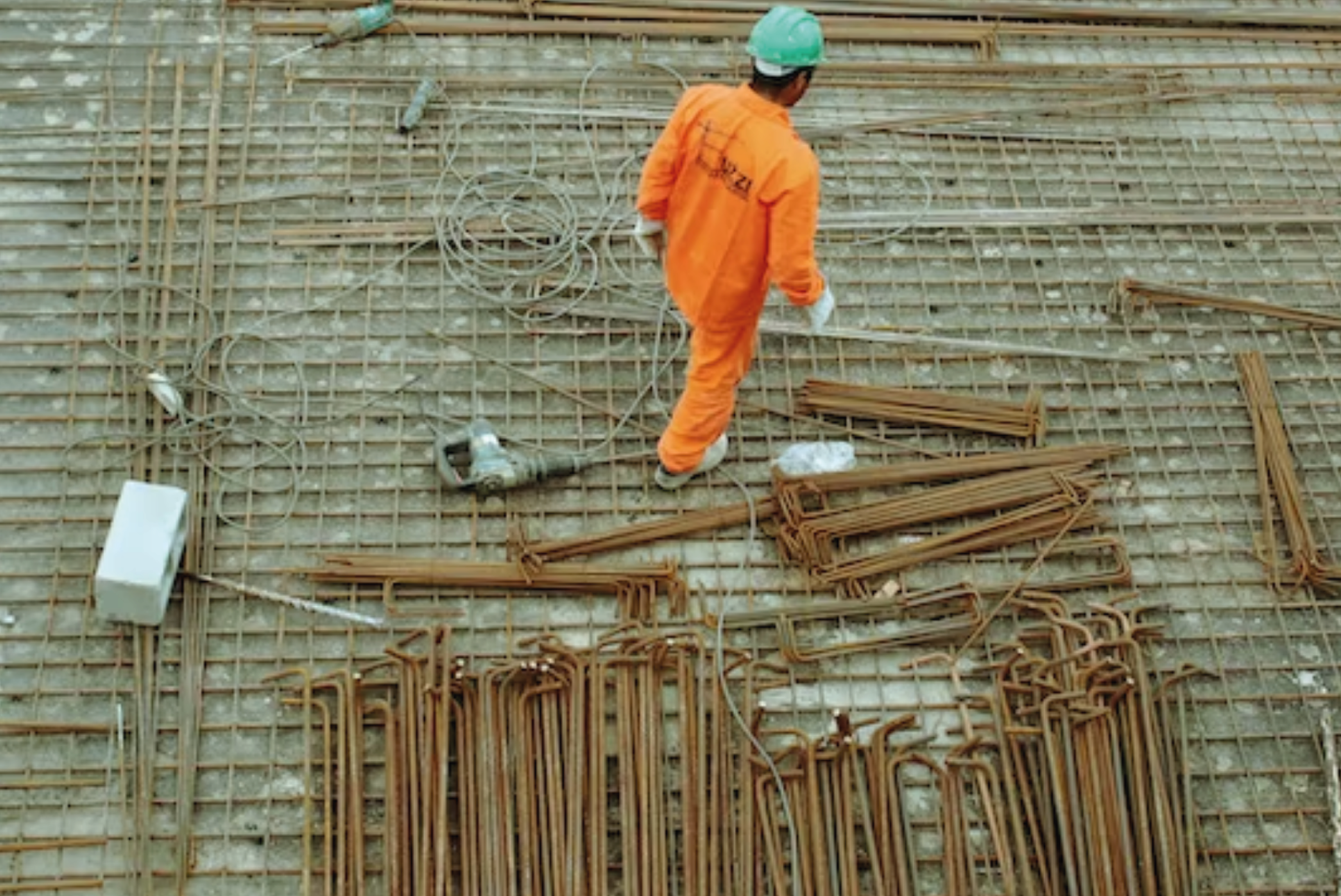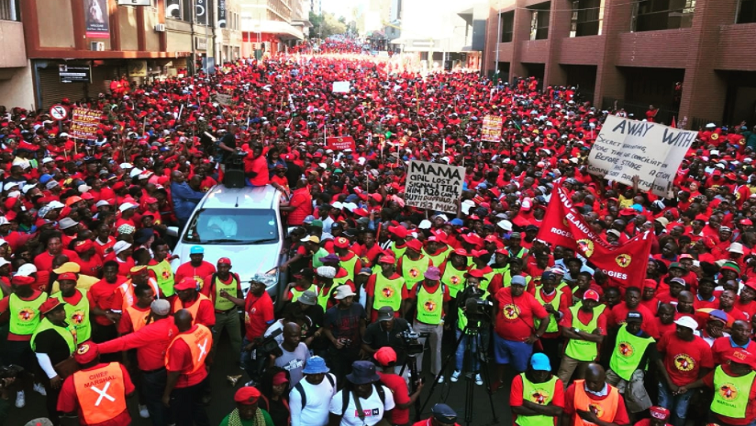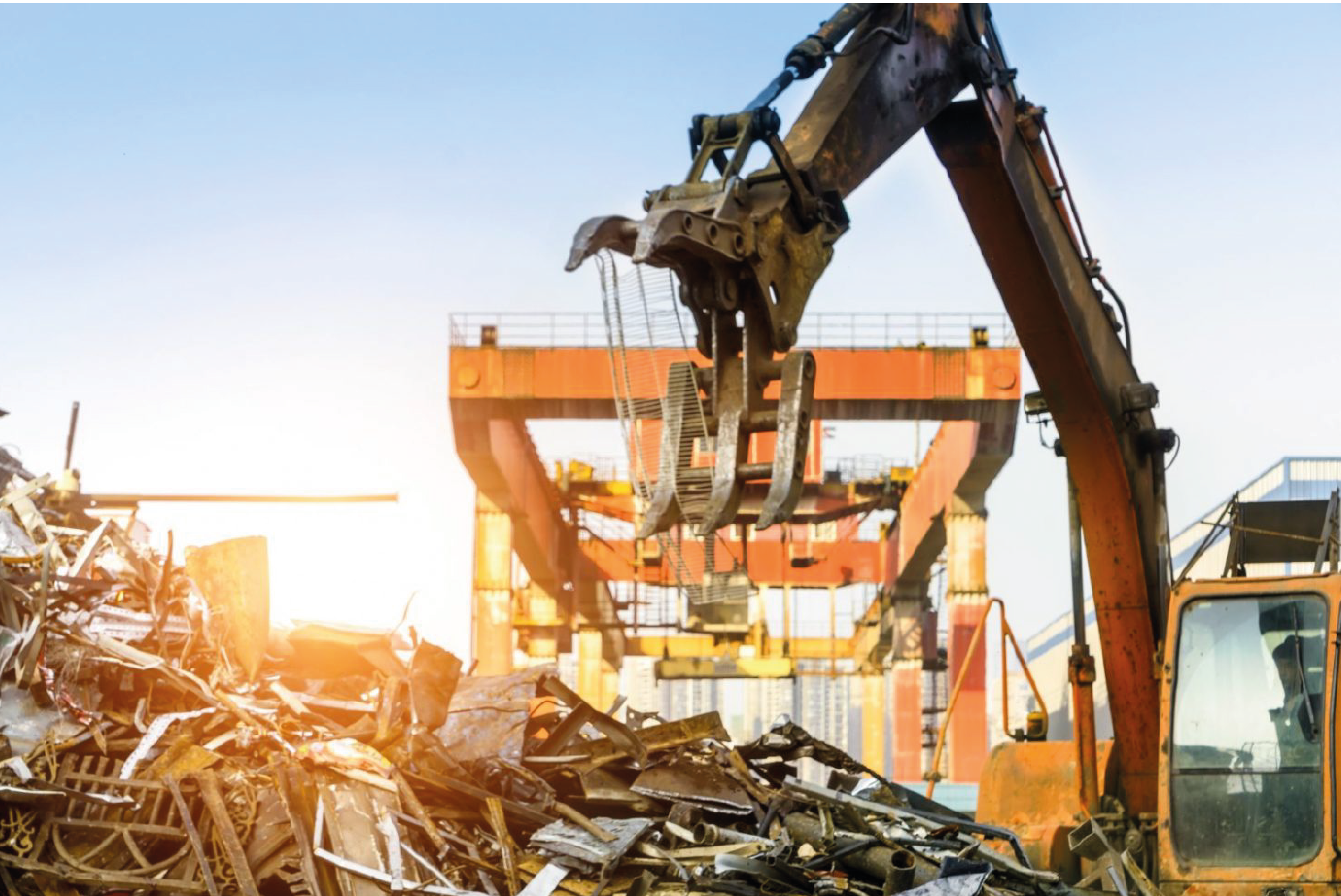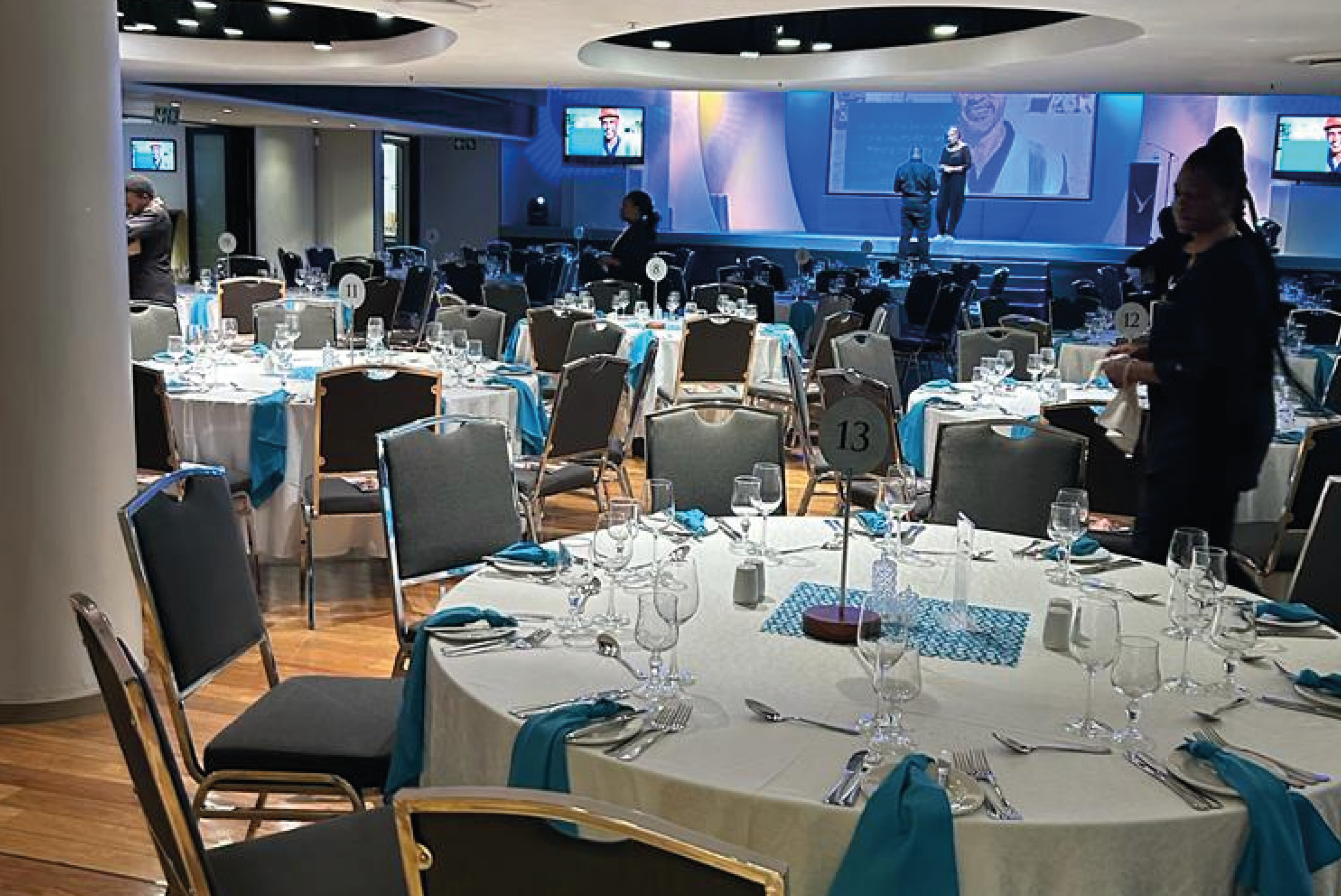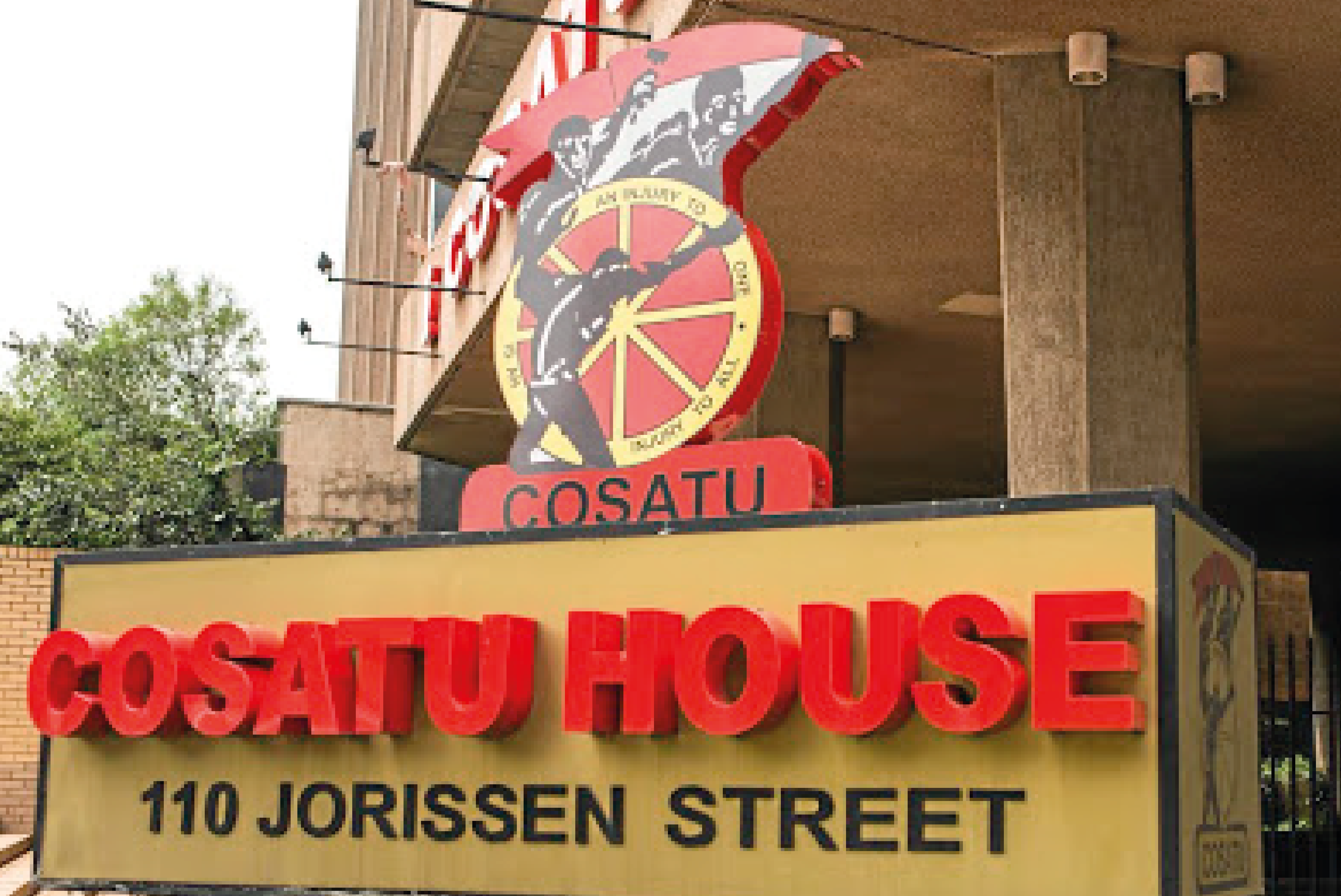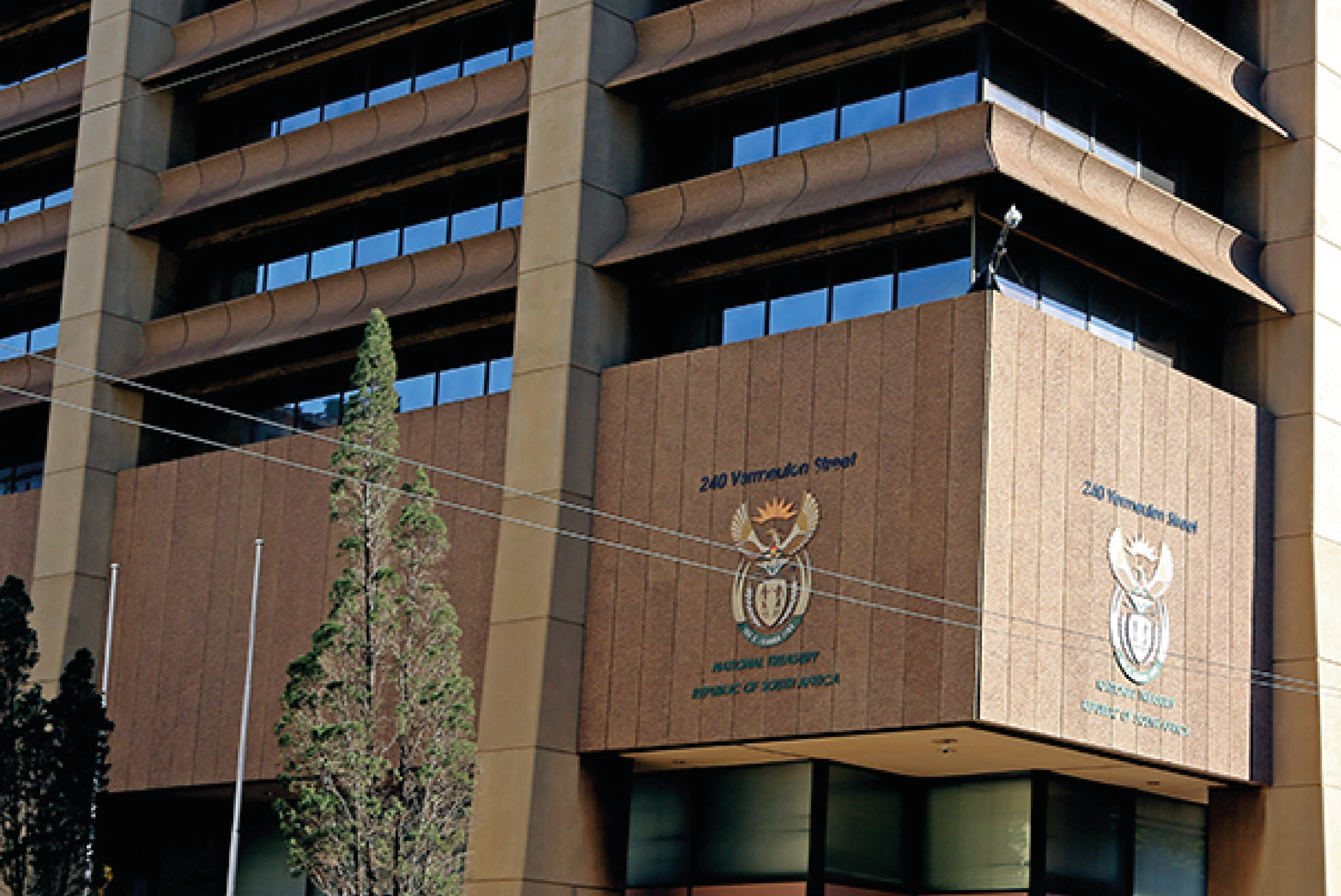The Collapse of the Steel Master Plan and Disintegration of Industry
4 December 2023Latest News,November 2023
The steel industry is the backbone of any economy, it forms the foundation of any modern economy and is essential to every single sector. Without a healthy and vibrant local steel industry, South Africa will simply not be able to integrate and develop itself or the rest of the continent. The steel sector – and South Africa – urgently needs clarity on policies, consensus on action plans and realised deliverables on the ground in order to instil confidence in the viability of the country to boost competitiveness and attract both local and foreign direct investment.
The recent announcement by ArcelorMittal South Africa on the potential closure of its operations in Newcastle and Vereeniging, as well as ArcelorMittal Rail and Structural presents a major set-back to the base of the industrial sector and industrialisation more broadly. This development also raises the sharp question whether the grand aspirations of the Steel Master Plan (SMP) to reindustrialise the steel industry are beginning to disintegrate under our watch. The unfortunate reality is that the lofty goals set by the SMP to charter a roadmap to reenergise the sector, expand production and demand across the steel and fabrication value chain are becoming increasingly illusive. There is a growing sense on the part of industry that the SMP has collapsed.
The SMP was pitched as the platform through which all the stakeholders, namely; government, business and labour, who have a direct and vested interest in seeing this industry prosper, would come together and work collaboratively to meet this end. The plan was sold as a deviation from the old and unproductive approach where government directs the path which industry should take and one where different stakeholders lobby the government toward their respective ends in an unstructured way. It was meant to be a unifying platform, where meaningful and active collaboration took place to arrest the rapid decline currently being experienced by the industry through short-term interventions and to grow the industry through longer dated interventions. Importantly, it was also meant to open avenues of communication and collaboration between all stakeholders.
The metals and engineering industries, and particularly the constituency I represent through the Steel and Engineering Industries Federation of Southern Africa (SEIFSA), fully committed itself to the SMP when it was launched in 2021. SEIFSA was a signatory to the founding document and nominated a number of captains of industry to lead various workstream. The SEIFSA team has invested considerable resources to the work of the SMP unlike some of the nay-sayers that wrote-off SMP at the outset.
Over the last year, SEIFSA has made numerous formal requests for a meeting with the Minister of Trade Industry and Competition on the scrap metal export ban and other much wider and arguably more important and strategic industrial policy concerns. Disappointingly, the meetings have not materialised and our requests have fallen on deaf ears.
We understand and acknowledge that Ministers leading key departments and portfolios are extremely busy, but what we cannot accept is the lack of decisive leadership from the DTIC, resulting in numerous decisions being strung out and not forthcoming. That said, it is ironic that some decisions, like the ban on scrap metal exports – with all its adverse implications – received priority preference and relatively fast decision turn-around times. A further concern to business is the delays in appointing permanent staff to critical decision-making roles. A significant number of DTIC staff, in key decision-making roles, hold them in an acting capacity and this in part contributes to the delays on decision-making.
Public consultation processes on regulations which are often undertaken when it is seemingly clear that a decision has already been taken. This suspicion on the part of business is supported by the unwillingness of the ministry to engage industry on a more in-depth basis on some of the more rational proposals submitted by industry, as in the case of the scrap metal export ban. Moreover, relating to the same scrap metal export ban there has been a very concerning shift in the goal post where the motivation to extend the export ban is now leaning to input cost support for the scrap-based mills and the country’s decarbonisation efforts, whereas the original reasons used to force the decision through were of a security nature and protection of infrastructure. Introducing industrial policy by stealth and misleading economic signals as in this case, renders the SMP as a platform to rubber-stamp and legitimise decisions, including those that do not enjoy support and alignment by a significant block of employers.
Overarching all of this is the fact that the SMP was meant to deliver a comprehensive industrial policy framework, where a total industry perspective would be taken and complementarities across the value chain enhanced. Sadly, what we are witnessing is the opposite, wherein policy is implemented in a fragmented manner, with a short-term view and with pockets of industry being pit against one another. The scrap metal export ban is one such divisive and market distorting development.
The industry is quickly losing faith in the SMP process and it is obvious but worth mentioning that the withdrawal of this constituency from the SMP would virtually render the plan moot.
Industry simply cannot continue to invest the amount of time, effort and resources as it has done thus far for altruistic reasons, particularly when the experienced reality is one of a continued deterioration of the business and operating environment, company closures and job losses.
Elias Monage
SEIFSA President
The collapse of the Steel Master Plan and disintegration of industry
1 December 2023Latest News,December 2023
The steel industry is the backbone of any economy, it forms the foundation of any modern economy and is essential to every single sector. Without a healthy and vibrant local steel industry, South Africa will simply not be able to integrate and develop itself or the rest of the continent. The steel sector – and South Africa – urgently needs clarity on policies, consensus on action plans and realised deliverables on the ground in order to instil confidence in the viability of the country to boost competitiveness and attract both local and foreign direct investment.
The recent announcement by ArcelorMittal South Africa on the potential closure of its operations in Newcastle and Vereeniging, as well as ArcelorMittal Rail and Structural presents a major set-back to the base of the industrial sector and industrialisation more broadly. This development also raises the sharp question whether the grand aspirations of the Steel Master Plan (SMP) to reindustrialise the steel industry are beginning to disintegrate under our watch. The unfortunate reality is that the lofty goals set by the SMP to charter a roadmap to reenergise the sector, expand production and demand across the steel and fabrication value chain are becoming increasingly illusive. There is a growing sense on the part of industry that the SMP has collapsed.
The SMP was pitched as the platform through which all the stakeholders, namely; government, business and labour, who have a direct and vested interest in seeing this industry prosper, would come together and work collaboratively to meet this end. The plan was sold as a deviation from the old and unproductive approach where government directs the path which industry should take and one where different stakeholders lobby the government toward their respective ends in an unstructured way. It was meant to be a unifying platform, where meaningful and active collaboration took place to arrest the rapid decline currently being experienced by the industry through short-term interventions and to grow the industry through longer dated interventions. Importantly, it was also meant to open avenues of communication and collaboration between all stakeholders.
The metals and engineering industries, and particularly the constituency I represent through the Steel and Engineering Industries Federation of Southern Africa (SEIFSA), fully committed itself to the SMP when it was launched in 2021. SEIFSA was a signatory to the founding document and nominated a number of captains of industry to lead various workstream. The SEIFSA team has invested considerable resources to the work of the SMP unlike some of the nay-sayers that wrote-off SMP at the outset.
Over the last year, SEIFSA has made numerous formal requests for a meeting with the Minister of Trade Industry and Competition on the scrap metal export ban and other much wider and arguably more important and strategic industrial policy concerns. Disappointingly, the meetings have not materialised and our requests have fallen on deaf ears.
We understand and acknowledge that Ministers leading key departments and portfolios are extremely busy, but what we cannot accept is the lack of decisive leadership from the DTIC, resulting in numerous decisions being strung out and not forthcoming. That said, it is ironic that some decisions, like the ban on scrap metal exports – with all its adverse implications – received priority preference and relatively fast decision turn-around times. A further concern to business is the delays in appointing permanent staff to critical decision-making roles. A significant number of DTIC staff, in key decision-making roles, hold them in an acting capacity and this in part contributes to the delays on decision-making.
Public consultation processes on regulations which are often undertaken when it is seemingly clear that a decision has already been taken. This suspicion on the part of business is supported by the unwillingness of the ministry to engage industry on a more in-depth basis on some of the more rational proposals submitted by industry, as in the case of the scrap metal export ban. Moreover, relating to the same scrap metal export ban there has been a very concerning shift in the goal post where the motivation to extend the export ban is now leaning to input cost support for the scrap-based mills and the country’s decarbonisation efforts, whereas the original reasons used to force the decision through were of a security nature and protection of infrastructure. Introducing industrial policy by stealth and misleading economic signals as in this case, renders the SMP as a platform to rubber-stamp and legitimise decisions, including those that do not enjoy support and alignment by a significant block of employers.
Overarching all of this is the fact that the SMP was meant to deliver a comprehensive industrial policy framework, where a total industry perspective would be taken and complementarities across the value chain enhanced. Sadly, what we are witnessing is the opposite, wherein policy is implemented in a fragmented manner, with a short-term view and with pockets of industry being pit against one another. The scrap metal export ban is one such divisive and market distorting development.
The industry is quickly losing faith in the SMP process and it is obvious but worth mentioning that the withdrawal of this constituency from the SMP would virtually render the plan moot. Industry simply cannot continue to invest the amount of time, effort and resources as it has done thus far for altruistic reasons, particularly when the experienced reality is one of a continued deterioration of the business and operating environment, company closures and job losses.
Elias Monage
SEIFSA President
Closure of Steel Production Capacity at ArcelorMittal will have devastating implications for South Africa and the Continent
29 November 2023Latest News,November 2023
Johannesburg, 29 November 2023. The announcement by ArcelorMittal South Africa on the closure of its operations in Newcastle and Vereeniging, as well as ArcelorMittal Rail and Structural will have a devastating impact on a number of fronts. These include the 3500 employees likely to be affected, the surrounding communities, suppliers, contractors and the broader metals and engineering sector.
Downstream industries are heavily reliant on the long-products that come from these plants to which a switch-over will not happen overnight. Even where these products can be imported this will result in the exporting of jobs that are desperately needed in South Africa. Moreover, the logistics challenges facing the country raise serious questions whether port and rail infrastructure can get product to the end manufactures.
A slow economy and difficult trading environment, high transport, logistics and energy costs, exacerbated by logistic failures and their resultant cost implications, the introduction of a preferential pricing system for scrap, a 20% export duty and more recently a ban on scrap exports have all played a major role in contributing to the current state of affairs. Compounding this is the DTIC’s blinkered and narrow focus on how best to create an enabling environment conducive to growth, stability and job security. SEIFSA has repeatedly warned that the decisions relating to the scrap metal policy and its industrial policy consequences will yield casualties. What we are seeing unfolding at ArcelorMittal feeds directly into these warnings.
SEIFSA’s acting for and on behalf of its broader membership, which make up by far the most representative voice of both the upstream and downstream value chains in the metals and engineering industry, is firmly of the view that these and related industrial policy matters be urgently escalated to the Economic Cluster of Ministries, as it seems that the DTIC seemingly does not have the capacity, nor the grasp of the broader implications of these developments.
The matter is now beyond urgent and we urge the President and key Ministers in the Economic Cluster to treat it as such, if we are to avoid a socio-economic catastrophe of gigantic proportions in the metals and engineering industry which will reverberate throughout the economy and the continent, impacting the auto, motor, construction and mining sub-sector of the economy and all who work in it.
The reconstruction and recovery of the South African economy and more specifically the metals and engineering industry must be looked at in the wider context of reindustrialising critical sectors, along with all the other challenges facing the economy from energy and logistics to the water infrastructure and crime.
It's more than just about wages
23 November 2023Latest News,November 2023
Monday, next week marks the commencement of the 2024 Main Agreement wage and conditions of employment negotiations with a dialogue amongst all key stakeholders to explore, examine and unpack various scenarios in anticipation of the forthcoming negotiations.
Whilst wages or the level at which wages are currently pegged in the current 2023/2024 wage tables will undoubtedly feature high on the agenda, what is ultimately at stake is far more important than just wages.
As we see out the current three-year deal concluded in 2021, it’s important that we take stock of what was achieved. A three-year wage deal guaranteeing wage increases on Rands and cents – something this industry has last seen more than 30 years ago – a working exemption procedure, a special phase-in dispensation available to all employers who have been under severe stress to at least commit to paying 60% of the 2020 rates by 30 June 2024 and lastly, gazettal and extension of the agreement to all employers and employees in the sector.
Gazettal was crucial in ensuring that as the sector battled through the most difficult economic circumstances in living memory, brought about by the lingering effects of the global covid-19 pandemic, unrelenting load shedding, crumbling infrastructure and failing logistics, the one thing we could guarantee over the life-span of the agreement was a three-year period of stability, security and industrial peace.
Whilst this may seem as cold comfort to the realities of business men and woman battling to keep their doors open and workers in jobs, matters could have spiraled quickly out of control had SEIFSA, acting in concert with the Trade Unions, the PCA (SA) and CEO thrown in the towel and walked away from the various legal assaults leveled against the Main Agreement.
As matters stand the Main Agreement concluded in 2021 has been dragged before the Labour Court, the Labour Appeal Court and the Constitutional Court and thus far has come out on the winning side at each and every step. One final review application stands to be heard, in all likelihood, either during next years’ negotiations or when the negotiations are done and dusted. Regardless of when the matter is set down, we will be in Court. Legal finality is what we seek once and for all.
The push for gazettal particularly on the part of the unions was a major contributing factor that triggered strike action in 2021 that lasted 21 days and cost the industry in excess of R600 million a day in lost revenue. If truth be told, it had very little to do with the SEIFSA final offer on the table, in fact that was the offer SEIFSA and the trade unions signed off on to end the strike.
In an industry like ours, where bargaining at central level has taken place for almost 80 years, it would be fair to say that the collective bargaining ritual that we have seen play-out time and time again is pretty well entrenched. Is it the best model, is it the sort of model that will see us climb out of the economic abyss we find ourselves; will it create the jobs we so desperately need to make a meaningly dent in our alarming unemployment statistics? Probably not, but it’s the only model we have, that has stood the test of time and delivered time and time again varying degrees of industrial peace, stability and security. This has come at a significant cost, granted, but five industry stoppages over 30+ years, a standstill or wage freeze agreement in 2020 (to counter covid-19), a three-year deal on Rands and cents and up and until gazettal was a regular feature (i.e., 2010) a level playing field where wages and terms and conditions of employment were not something to be used to gain an unfair advantage over one’s competitors.
It's often said that voters and the absence of voters at the polling both, get the government they deserve. The same analogy can be applied in industry negotiations, namely when the conversation doesn’t suit a particular constituency there is a tendency to walk away and throw one’s hands in the air and blame SEIFSA. We’ve seen this play out time and time again, and I truly hope we will not see this in 2024.
Negotiations is not always about getting what you want or what you think you deserve. It’s about staying the course, through thick and thin, taking the hits and still being prepared to turn the page and come up with a counter that with a little persuasion may just swing things.
I should know I’ve been doing this going onto 34 years next year. I’ve been extremely fortunate to have great and experienced team of leaders around me who have proven time and again that ingenuity, experience and always looking for common ground is what wins the day, always.
I sincerely hope that as we embark on this journey into 2024, the dialogue session amongst equals on Monday is the start of a new journey that hopefully will not end with the same trite outcomes but instead marks the beginning of something new and fresh.
As our country prepares for General Elections in 2024, let this industry lead the way by concluding a deal that we all deserve. Next year is so much more than just about wages.
Lucio Trentini
Chief Executive Officer
SAFTU’S Intended protest action 29 November 2023
Introduction
Management may be aware, from recent media reports, that the South African Federation of Trade Unions (SAFTU), intends calling workers to support a socio-economic protest action on Wednesday, 29 November 2023.
Protest Action and the Labour Relations Act
The Labour Relations Act (LRA) permits registered trade unions or federations such as SAFTU, of which NUMSA amongst others is a member, to undertake protected protest action to promote the social and economic interests of workers provided that they observe the procedural requirements contained in Section 77 (1) (b) of the LRA 66 of 1995, as amended.
This application was duly considered by NEDLAC and the NEDLAC Section 77 Standing Committee has determined the notice to be compliant with the administrative requirements of the LRA. COSATU can therefore go on protest action based on their notice submitted on NEDLAC on 10 November 2023. Procedurally, they have met the requirements.
Consequently, any employees participating in any action on 29th November 2023 will be protected by the normal rules regarding protected strike-action, namely: no-work-no-pay and no disciplinary action.
Management Guidelines on Possible Absenteeism on Wednesday, 29 November 2023
SEIFSA recommends that management adopt the following course of action in dealing with any stay-away from work on the 29th November:
- Inform all workers that any absences related to the protest action will be treated on the following basis:
- no work, no pay;
- no disciplinary action for participation in the protest action but excluding any misconduct during the protest;
- a shift for leave-pay and leave-enhancement pay qualification purposes will be lost in respect of the day’s absence; and
- any overtime worked during the course of the week will be paid at ordinary rates to make up for the lost ordinary working hours from Wednesday, 29th November 2023.
The Staff of the SEIFSA Industrial Relations Division are available on (011) 298-9400 to provide any further advice and/ or assistance to management on the contents of this management brief.
22 November 2023
Scrap Metal ban is not working and should not be extended
21 November 2023Latest News,November 2023
Johannesburg, 21 November 2023. The SEIFSA Office has noted with concern submissions to the DTIC calling for the extension to the scrap metal export ban which is scheduled to come to an end in December 2023.
“SEIFSA’s position has always been that the scrap metal export ban is misguided in the issue that it is attempting to solve for, namely infrastructure damage for scrap metal theft. It is an extremely blunt measure with unintended industrial policy consequences. More worryingly it communicates a very poor economic signal by not taking into account a total steel perspective” Mr Elias Monage, SEIFSA President states.
In the deliberations regarding the scrap metal export ban SEIFSA is beginning to note with some concern a shifting in the goal posts, where discussion are beginning to lean to the export ban being used as an industrial policy instrument to support scrap-based mills and the country’s decarbonisation efforts, which was never the original motivation for the ban.
“The initial intention was always security related aspects and to attempt to limit the damage to infrastructure, with other considerations – whether noble or adverse - being ancillary to the core issue” comments Mr Monage.
Apart from SEIFSA’s repeated submission that the export ban is the incorrect instrument to solve a security related matter, to introduce industrial policy by stealth in this manner would be very poor economic signalling on the part of the Department of Trade, Industry and Competition (DTIC).
“If it is the intention of the DTIC to introduce a new industrial policy regime then the economic signalling should have been communicated as such and developed, with industry, taking the total steel sector perspective into account” states Mr Monage.
Poor and/or misleading economic signals run the risk of the DTIC losing the trust of the investment community due to the instability created in the economic environment. This stability is paramount particularly to the long-term nature of the investments associated with this sector.
“The scrap metal export ban creates a disproportionate and policy induced – not producer efficiency – input cost advantage that is afforded to only a select group of producers where scrap metal is used as an input” states Mr Monage.
In the absence of a mechanism similar to a Price-Preference-System (PPS) on iron ore, that attempts to level the playing field, pockets of the value chain are rendered uncompetitive, relative to the beneficiaries of the scrap metal ban. There also does not exist any regulatory mechanism that ensures that this input cost advantage is passed down the value chain, which again renders the intervention extremely narrow in its perceived benefits.
The scrap metal export ban also presents World Trade Organisation (WTO) contraventions and anti-competitive behaviour from a predatory pricing point of view, all of which the DTIC has opened the country up to from the decision to impose the export ban.
Whilst the unsuccessful export ban has undoubtedly been abused by consumers and
lead to prejudicial consequences, the critical question that still remains is whether the
unsuccessful ban on ferrous scrap exports and suspension of the Price Preference System (PPS) has contributed in any meaningful way to the fulfilment of the objective of the directive – the elimination and/or reduction of metal theft and associated criminal activity. The undeniable answer to this question is that it has not.
“Given all the negative consequences accompanying the scrap metal export ban and the fact that it is not working, SEIFSA strongly urges the Department of Trade, Industry and Competition not extend the scrap metal export ban beyond December 2023” states Mr Monage
SEIFSA Awards for Excellence Honour Companies in the Metals and Engineering Sector
20 November 2023Latest News,November 2023
Companies in the Metals and Engineering Sector were recognised for their talent and hard work at the SEIFSA Awards for Excellence on November 17 2023 at The Venue at Melrose Arch, Johannesburg.
The industry's premier recognition platform ensured companies of all sizes had the chance to bask in the spotlight among their peers.
SEIFSA CEO Lucio Trentini awarded the prestigious Outstanding Service to the Industry Award to Chris Murray, introducing him as someone who “has had played a significant role in the work of SEIFSA, the industry and associated forums and platforms for almost 40 years”.
Murray, a former SEIFSA president, has held various executive positions as both managing director and board member for various companies, including being the chair of the Haggie Group of Companies until his official retirement in 2004.
“I, on behalf of all of SEIFSA, past and present, am immensely grateful to you for your invaluable support to the Federation and contribution to the industry over the years,” said Trentini.
The Business Women of the Year Award was awarded to Racheal Njoroge, former managing director of Cummins Southern Africa and now Strategic Programs and Integrations Director, Cummins, Africa and Middle East.
Tafadzwa Chibanguza, SEIFSA COO, described Njoroge as a “remarkable leader who has consistently demonstrated her dedication, vision and commitment to achieving milestones while cultivating healthy work environments”.
While managing director at Cummins she helped the company reach new heights, including posting record-breaking financial results for the year 2022. “Under her leadership, the company witnessed unprecedented growth and profitability, setting new standards for success in the Southern African region,” says Chibanguza
Njoroge may have been named the winner, but there were three other nominees in the category:
Pam du Plessis Maning Director, Invincible Valves,
Honey Mamabolo Chief Executive Officer, The South African Mint Company and
Melanie Mulholland, Chief Executive Officer, Cape and Engineers and Founders Association
Actom won the Corporate Social Responsibility Award, which recognised the company for making a positive impact on society and demonstrating “an unwavering commitment to creating a positive impact on society” says Nuraan Alli, Marketing, Sales and Communication Executive.
This year a new award has been added, the BRICS Award, in conjunction with the BRICS Business Council.
The award sought to recognise the decarbonisation efforts of a metal producing company that operates within the BRICS member countries. ArcelorMittal South Africa won the award for its ongoing decarbonisation roadmap as well as its associated progress and investment towards decarbonising the steel sector, which is one of the hardest sectors to abate globally.
SEIFSA CEO Lucio Trentini adds that “the vision and progress being made by ArcelorMittal South Africa in its decarbonisation effort not only has profound benefit for the company and the upstream steel industry, but the entire Metals and Engineering Sector, given the company’s position at the beginning of the value chain. Companies in the downstream that are consumers of this steel will in the future enjoy the benefit of the less-carbon intensive steels”.
SEIFSA Awards for Excellence winners:
- Best Customer Service Award: Dynamic Fluid Control
- Company Artisan Training Award: Macsteel
- Corporate Social Responsibility: Actom
- Environmental Stewardship: Electrolux
- Most Digitally Innovative Company: Aberdare
- BRICS Award: ArcelorMittal
- The workplace Health and Safety Award: Dynamic Fluid Control
- Business Women of the Year Award: Racheal Njoroge, Cummins Southern Africa
- Outstanding Contribution to the Industry: Chris Murray
COSATU intended protest action 3 November 2023
2 November 2023Latest News,September 2023
Introduction
Management may be aware, from recent media reports, that the Congress of South African Trade Unions (COSATU), intends calling workers to support a socio-economic protest action on Friday, 3 November 2023.
Protest Action and the Labour Relations Act
The Labour Relations Act (LRA) permits registered trade unions or federations such as COSATU, to undertake protected protest action to promote the social and economic interests of workers provided that they observe the procedural requirements contained in Section 77 (1) (b) of the LRA 66 of 1995, as amended.
This application was duly considered by NEDLAC and the NEDLAC Section 77 Standing Committee has determined the notice to be NOT compliant with the administrative requirements of the LRA.
Consequently, any employees participating in any action on 3 November 2023 will NOT be protected by the normal rules regarding protected strike-action.
Management Guidelines on Possible Absenteeism on Friday, 3 November 2023:
SEIFSA recommends that management adopt the following course of action in dealing with any stay-away from work on the 3rd November:
- Inform all workers that any absences related to the protest action will be treated on the following basis:
- no work, no pay;
- That management reserves the right to take disciplinary action for participation in the protest action including any misconduct during the protest;
- a shift for leave-pay and leave-enhancement pay qualification purposes will be lost in respect of the day’s absence; and
- any overtime worked during the course of the week will be paid at ordinary rates to make up for the lost ordinary working hours from Friday, 3rd November 2023.
Notice to NEDLAC on the intention to proceed with protest action.pdf
Letter of notice
The Staff of the SEIFSA Industrial Relations Division are available on (011) 298-9400 to provide any further advice and/ or assistance to management on the contents of this management brief.
Lucio Trentini
Chief Executive Officer
SEIFSA welcomes the policy pronouncements in the Medium-term Budget Policy Statement
2 November 2023Latest News,November 2023
Johannesburg, 1 November 2023 - The 2023 Medium Term Budget Policy Statement (MTPBS) recognises, reflects and has been structured to respond to key headwinds facing the global and South African economy.
The policy positions contained in this mini-budget are welcome for the fact that they communicate important reform signals. The only way to place the economy on a solid and sustainable trajectory is through economic growth and to achieve that, reform is critical. Particularly reform in the delivery of large-scale infrastructure projects.
For the steel sector, one of the most important policy considerations communicated is the opportunity for the private-public-partnerships (PPPs) in the financing and execution of large infrastructure projects. This will ensure that projects are executed with efficiency and speed.
The MTPBS posits the creation of new mechanisms to facilitate co-investing with the private sector and multilateral institutions on selected infrastructure projects and employing alternative financing instruments for priority projects.
These infrastructure projects are a crucial demand source for the metals and engineering sector, which has been languishing in a low demand environment for the last 15 years, therefore their speedy and successful execution is of significant importance to the sustainability of the sector.
We eagerly await the details that will underpin this PPP framework. However, even prior to this announcement in the MTPBS today, SEIFSA have already begun engaging relevant departments, including National Treasury to fast track this objective.
SEIFSA Bursary opportunity
1 November 2023Latest News,November 2023
ABOUT THE SEIFSA BURSARY
The Steel and Engineering Industries Federation of Southern Africa (SEIFSA) support and promotes the development of skilled human capital relevant to the Steel and Engineering industry. SEIFSA grants bursaries every year to learners who are pursuing a career related to the Steel and Engineering sector. The financial assistance is awarded to qualified full-time students registered for approved undergraduate Engineering programmes at South African Universities or students studying towards a National Diploma in Engineering at University of Technology (UoT).
The following prescribed fields of study are accepted to the SEIFSA bursary scheme: Chemical Engineering, Civil Engineering, Electrical Engineering, Electronics Engineering, Industrial Engineering, Materials Science, Mechanical Engineering, Metallurgical Engineering or other related Engineering coursesThe SEIFSA bursary will only cover the cost of tuition fees (students are liable for all other study costs such as accommodation, meals, stationery, study material, etc)
BURSARY REQUIREMENTS
Applicants will have to fulfill the following criteria:
- Be a South African citizen
- 35 years old or younger (Youth)
- Good academic results for Mathematics and Science with a minimum of 75% average on Grade 12 / Matric
- Studying or provisional acceptance into an undergraduate course at South African University or University of Technology in South Africa
- Registered to study at a recognized South African University or University of Technology in South Africa
- Must be enrolled to study any of the engineering courses or related engineering courses stipulated above
Note: Preference will be given to employees of SEIFSA member companies and dependents.
HOW TO APPLY
STEP1: Download and complete the SEIFSA Bursary Application Form
STEP2: Email completed bursary application form and supporting documentation to bursaryapplications@seifsa.co.za (insert the words “SEIFSA Bursary Application – Your full name in the email subject line)
Note: Applicants will be notified of the results of their applications before the end of 31 January 2024. An award letter will be given to the successful candidate. The institution will be notified regarding the awarding of the bursary
OPENING & CLOSING DATE
1st of November 2023 to 30th November 2023
QUERIES
For any queries regarding this specific bursary program, contact the Bursary Project Administrator; Mabandla Nhlapo
TEL: 011 298 9425
EMAIL: bursaryapplications@seifsa.co.za



